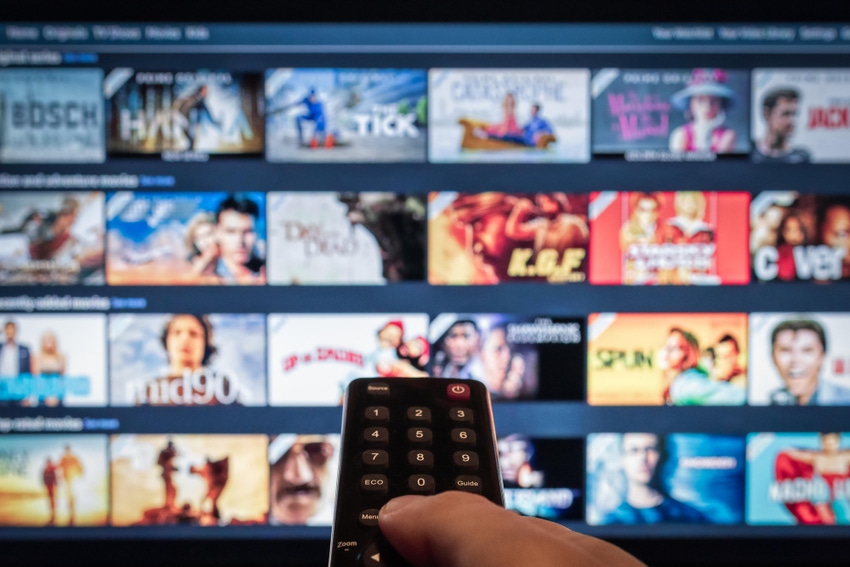New sports streaming bundle will be 'consumer-friendly,' Charter CEO says
The new sports streaming JV from Disney, Fox and Warner Bros. Discovery is an 'admission' from programmers that the video market is ripe for flexible, genre-based packaging and à la carte options, says Charter CEO Chris Winfrey.

The details underpinning a sports streaming bundle from Disney, Fox and Warner Bros. Discovery (WBD) are still being ironed out. But the overall approach is "consumer friendly" and represents the kind of package that other distributors should be allowed to offer, said Charter Communications President and CEO Chris Winfrey.
Removing minimum penetration requirements, offering genre-based packaging and enabling à la carte models "is very consumer friendly," Winfrey said Wednesday at the Morgan Stanley Technology Media and Telecom Conference.
He also said he believes the formation of the sports streaming joint venture is an "admission" by programmers that the video market requires more flexible, genre-based packaging and à la carte options.
"Distributors have been saying that for a couple of decades now, that we'd like the ability to do genre-based packaging," Winfrey said. "If you step back, it's an admission from the programmers that that is the right way to go, together with à la carte, which is also something you thought you'd never see … I fully expect we'll have the ability to distribute content in a similar fashion."
Winfrey said Xumo, the Comcast-Charter national streaming joint venture, would be a good place for it.
It's not clear if or when Charter and other distributors might have that opportunity.
Challenges to new bundle
For now, Disney, Fox and WBD plan to sell the new bundle as a standalone, direct-to-consumer service and make it available through their own streaming services, including Disney+, Hulu and Max.
The planned offering is already getting some static. Fubo, a sports-focused virtual multichannel video programming distributor (vMVPD), has filed a lawsuit against the trio of programmers on antitrust grounds, and the US Department of Justice reportedly plans to review the new service (also on potential antitrust concerns) but will wait until the joint venture is finalized.
Winfrey also wondered if the proposed sports streaming service, which will hold about 60% of TV sports rights, is enough to satisfy sports fans.
"I'm not really sure it scratches the itch for a sports fanatic, or that a sports fanatic has no interest in news or entertainment," he said. But he allowed that there are ways to create packages around that shortcoming.
'Cellphone Internet'
Wednesday's discussion also focused on broadband, where Charter and other cable operators are struggling to grow subscribers amid a massive pull forward of customers during the early phases of the pandemic, increased competition and a sluggish housing move environment.
"We're in a lull right now from a net-add perspective," Winfrey said.
The portability of fixed wireless access (FWA) is an advantage, according to Winfrey. But he continued to disparage it as an "inferior" technology.
Winfrey also shared Charter's less-than-flattering label for FWA: "cellphone Internet."
"That's what it is," he declared, noting that Charter uses 5G as a backup for enterprise customers.
Winfrey said Charter and the rest of the cable industry can do a better job marketing its broadband capabilities compared to FWA, noting that FWA's relatively low price point is due to the customer "overpaying on a mobile line."
Charter has gone on the offensive against FWA. Among recent examples, the company ran a spot during last month's Super Bowl that mocked the speed and reliability of T-Mobile's FWA service.
"The industry, and us in particular, can do better," Winfrey said.
On the fiber side, Charter is in the midst of upgrades of its hybrid fiber/coax (HFC) network aimed at providing multi-gigabit downstream speeds and at least 1 Gbit/s in the upstream. That plan includes the deployment of DOCSIS 4.0 to about 35% of Charter's HFC footprint.
Hopes for ACP's survival
Winfrey also weighed in on the potential demise of the Affordable Connectivity Program (ACP), which is poised to run out of money next month unless Congress steps in to refund it.
Charter, which has about 5 million ACP recipients, is the cable operator most exposed by the possible end of the program.
Winfrey said he is still hopeful that ACP will be refunded, but he stressed that Charter will have options to help those customers stay connected and save money.
"I think it's a bipartisan issue. I think there's support to make it happen," Winfrey said. "And I hope leadership is willing to bring the issue to the table and get it renewed in a sustainable way."
But he warned that the end of ACP will be disruptive and that it will have a "meaningful impact to net additions" at Charter if the program does not survive.
"The reality is there will be an impact to low-income customers if the program isn't renewed," Winfrey said. "But it doesn't change the long term trajectory of where we go."
CBRS update
Flipping to mobile and wireless, Winfrey confirmed that Charlotte, North Carolina, is the location of Charter's first full-market rollout of CBRS. Charter plans to deploy CBRS to a second yet-to-be-named market later this year.
Charter is using CBRS in high-usage areas in part to lower its mobile virtual network operator (MVNO) costs to Verizon.
But Charter's not in a rush to expand yet given that it's got plenty of other capital-intensive projects on the front burner, including its HFC upgrade, fiber network expansions in rural areas and its video transformation to the Xumo platform.
"The returns for CBRS will be there today, it'll be there tomorrow. In fact, the more mobile lines we have, the better the returns get," Winfrey said. "We're still moving ahead at a pretty good pace [with CBRS], but at some point we'll want to go faster. We're not doing that just yet."
About the Author(s)
You May Also Like




_International_Software_Products.jpeg?width=300&auto=webp&quality=80&disable=upscale)







